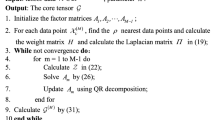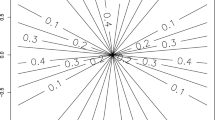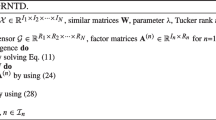Abstract
Some theoretical difficulties that arise from dimensionality reduction for tensors with non-negative coefficients is discussed in this paper. A necessary and sufficient condition is derived for a low non-negative rank tensor to admit a non-negative Tucker decomposition with a core of the same non-negative rank. Moreover, we provide evidence that the only algorithm operating mode-wise, minimizing the dimensions of the features spaces, and that can guarantee the non-negative core to have low non-negative rank requires identifying on each mode a cone with possibly a very large number of extreme rays. To illustrate our observations, some existing algorithms that compute the non-negative Tucker decomposition are described and tested on synthetic data.
J.E. Cohen—Research funded by ERC advanced grant “DECODA” no. 320594, ERC starting grant “COLORAMAP” no. 679515, and F.R.S.-FNRS incentive grant for scientific research n\(^\text {o}\) F.4501.16.
Access this chapter
Tax calculation will be finalised at checkout
Purchases are for personal use only
Similar content being viewed by others
References
Schwartz, L., Bamberger, Y., Bourguignon, J.-P.: Les tenseurs (1977)
Brewer, J.: Kronecker products and matrix calculus in system theory. IEEE Trans. Circ. Syst. 25(9), 772–781 (1978)
Cohen, J.E.: Environmental multiway data mining, Ph.D. dissertation, Universite Grenoble Alpes (2016)
Hitchcock, F.L.: The expression of a tensor or a polyadic as a sum of products. J. Math. Phys. 6(1), 164–189 (1927)
Papalexakis, E.E., Faloutsos, C., Sidiropoulos, N.D.: Tensors for data mining and data fusion: models, applications, and scalable algorithms. ACM Trans. Intell. Syst. Technol. (TIST) 8(2), 16 (2016)
Mørup, M., Hansen, L.K., Arnfred, S.M.: Algorithms for sparse nonnegative tucker decompositions. Neural Comput. 20(8), 2112–2131 (2008)
Zhou, G., Cichocki, A., Zhao, Q., Xie, S.: Efficient nonnegative tucker decompositions: algorithms and uniqueness. IEEE Trans. Image Process. 24(12), 4990–5003 (2015)
De Lathauwer, L., De Moor, B., Vandewalle, J.: A multilinear singular value decomposition. SIAM J. Matrix Anal. Appl. 21(4), 1253–1278 (2000)
Acar, E., Yener, B.: Unsupervised multiway data analysis: a literature survey. IEEE Trans. Knowl. Data Eng. 21(1), 6–20 (2009)
Bro, R.: Parafac. tutorial and applications. Chemometr. Intell. Lab. Syst. 38(2), 149–171 (1997)
Ziegler, G.M.: Lectures on Polytopes, vol. 152. Springer Science & Business Media, New York (1995)
D’Alessandro, P.: Conical Approach to Linear Programming. CRC Press (1997)
Laurberg, H., Christensen, M.G., Plumbley, M.D., Hansen, L.K., Jensen, S.H.: Theorems on positive data: on the uniqueness of NMF. Comput. Intell. Neurosci. 2008 (2008)
Phan, A.H., Cichocki, A.: Extended HALS algorithm for nonnegative tucker decomposition and its applications for multiway analysis and classification. Neurocomputing 74(11), 1956–1969 (2011)
Gillis, N., Glineur, F.: Accelerated multiplicative updates and hierarchical ALS algorithms for nonnegative matrix factorization. Neural Comput. 24(4), 1085–1105 (2012)
Acknowledgements
The authors wish to thank the reviewers as well as the editor for very precious technical comments on a first version of this communication.
Author information
Authors and Affiliations
Corresponding author
Editor information
Editors and Affiliations
Rights and permissions
Copyright information
© 2017 Springer International Publishing AG
About this paper
Cite this paper
Cohen, J.E., Comon, P., Gillis, N. (2017). Some Theory on Non-negative Tucker Decomposition. In: Tichavský, P., Babaie-Zadeh, M., Michel, O., Thirion-Moreau, N. (eds) Latent Variable Analysis and Signal Separation. LVA/ICA 2017. Lecture Notes in Computer Science(), vol 10169. Springer, Cham. https://doi.org/10.1007/978-3-319-53547-0_15
Download citation
DOI: https://doi.org/10.1007/978-3-319-53547-0_15
Published:
Publisher Name: Springer, Cham
Print ISBN: 978-3-319-53546-3
Online ISBN: 978-3-319-53547-0
eBook Packages: Computer ScienceComputer Science (R0)




